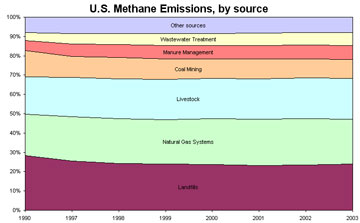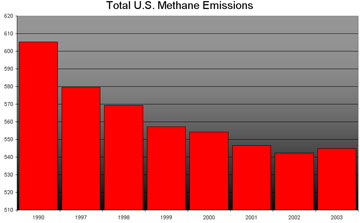Atmospheric levels of key greenhouse gas stabilize, could begin to decline
Atmospheric levels of key greenhouse gas stabilize, could begin to decline
mongabay.com
November 20, 2006
Atmospheric levels of methane, a potent greenhouse gas have leveled off for the past seven years according to scientists at the University of California, Irvine. The stabilization could have important implications for the response to climate change.
Methane, a gas with twenty times more heat-trapping potential than carbon dioxide, is produced by both human activities and natural causes. About one-third of methane emissions come from oceans, wetlands, wildfires, and termites, while two-thirds from from the production of oil and natural gas, mining, sewage and decomposition of garbage, changes in land use and deforestation, and livestock.
Most methane emissions never reach the atmosphere — they are broken down by ultraviolet radiation. For methane that does reach the atmosphere, the gas has a lifetime of about eight years. In contrast, carbon dioxide can last a century in the atmosphere. As such, atmospheric methane levels can be quickly reduced, while carbon dioxide accumulates and presents a long-term problem. Still, methane levels have more than doubled since the beginning of the Industrial Revolution in the 18th century, and annual emissions have again begun to creep up after declining in the 1990s.

US Methane Emissions by Source, 1990-2003. US Methane Emissions, 1990-2003. |
UC Irvine professors F. Sherwood Rowland and Donald R. Blake, co-authors of a methane research paper Nov. 23 online edition of Geophysical Research Letters, say that the atmospheric stabilization of methane is an encouraging sign in the fight against global warming.
“If one really tightens emissions, the amount of methane in the atmosphere 10 years from now could be less than it is today. We will gain some ground on global warming if methane is not as large a contributor in the future as it has been in the past century,” said Rowland, a Professor of Chemistry and Earth System Science and co-recipient of the 1995 Nobel Prize for Chemistry for discovering that CFCs were damaging the Earth’s protective ozone layer.
“If carbon dioxide levels were the same today as they were in 2000, the global warming discussion would leave the front page. But to stabilize this greenhouse gas, we would have to cut way back on emissions,” added Rowland. “Methane is not as significant a greenhouse gas as carbon dioxide, but its effects are important. The world needs to work hard to reduce emissions of all greenhouse gases.”
Some scientists have expressed concern that climate warming could someday destabilize large frozen deposits of methane that exist in the Arctic and on the bottom of the ocean. The melting of these deposits, which are only stable only under low temperature and relatively high pressure, could trigger a massive release of methane into the atmosphere, worsening global warming. Some scientists believe past melting of methane hydrates may have been partly responsible for episodes of rapid climate change in the past.








